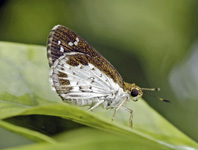Abstract
Five new eriophyoid mite species (Eriophyidae) from Turkey are described and illustrated in this paper: Aceria vanensis n. sp., Aceria onosmae n. sp., Aculus lydii n. sp., Aculus gebeliae n. sp. and Aculus spectabilis n. sp.. The descriptions are based on the morphology of females collected from weedy plants, respectively: Amaranthus retroflexus L. (Amaranthaceae), Onosma isauricum Boiss. et Heldr. (Boraginaceae), Hypericum lydium Boiss. (Hypericaceae), Lotus gebelia Vent. (Fabaceae) and Stachys spectabilis Choisy ex DC. (Lamiaceae). The new species were found to be vagrant on their host plants with no visible damage symptoms observed.
References
Abou-Awad, B.A. & El-Banhawy, E.M. (1992) New gall mites of the superfamily Eriophyoidea from East Africa (Arachnida: Acari). Acarologia, 33 (1), 69–74.
Amrine, J.W. Jr. & Stasny, T.A. (1994) Catalog of the Eriophyoidea (Acarina: Prostigmata) of the World. Indira Publishing House, West Bloomfield, Michigan, 804 pp.
Amrine, J.W. Jr. & Manson, D.C.M. (1996) Chapter 1.6.3 Preparation, mounting and descriptive study of eriophyoid mites. In: Lindquist E.E., Sabelis, M.W. & Bruin, J. (Eds.), Eriophyoid Mites: their Biology, Natural Enemies and Control. World Crop Pests, 6, pp. 383–396. [Elsevier Science B.V. publishing, Amsterdam, The Netherlands]
http://dx.doi.org/10.1016/S1572-4379(96)80023-6Amrine, J.W. Jr., Stasny, T.A.H. & Flechtmann, C.H.W. (2003) Revised Keys to the World Genera of the Eriophyoidea (Acari: Prostigmata). Indira Publishing House, West Bloomfield, Michigan, 244 pp.
Boczek, J. (1961) Studies on eriophyid mites of Poland II. Acarologia, 3 (4), 560–570.
Boczek, J. & Knihinicki, D. (1998) Studies on Eriophyoid Mites. XXVII. Bulletin of the Polish Academy of Sciences – Biological Sciences, 46 (3–4), 141–146.
Canestrini, G. (1891) Sopra tre nuove specie di Phytoptus. (Terza serie). Bollettino della Societá Veneto-Trentina di Scienze Naturali, 5 (1), 43–44.
Davis, P.H., Mill, R.R. & Tan, K. (1988) Flora of Turkey and the East Aegean Islands vol. 10 (Supplement). Edinburgh University Press, Edinburgh, 590 pp.
de Lillo, E., Craemer, C., Amrine, J.W. Jr. & Nuzzaci, G. (2010) Recommended procedures and techniques for morphological studies of Eriophyoidea (Acari: Prostigmata). Experimental and Applied Acarology, 51, 283–307.
http://dx.doi.org/10.1007/s10493-009-9311-xDenizhan, E., Monfreda, R., de Lillo, E. & Çobanoğlu, S. (2015) Eriophyoid mite fauna (Acari: Trombidiformes: Eriophyoidea) of Turkey: new species, new distribution reports and an updated catalogue. Zootaxa, 3991 (1), 1–63.
http://dx.doi.org/10.11646/zootaxa.3991.1.1Ekim, T. & Guner, A. (2000) The floristic richness of Turkey. Curtis's Botanical Magazine, 17 (2), 48–59.
http://dx.doi.org/10.1111/1467-8748.00247Karagöz, A. (2003) Plant genetic resources conservation in Turkey. Acta Horticulturae (ISHS), 598, 17–25.
http://dx.doi.org/10.17660/ActaHortic.2003.598.1Keifer, H.H. (1944) Eriophyid studies XIV. Bulletin of the California Department of Agriculture, 33, 18–38.
Keifer, H.H. (1959) Eriophyid studies C-3. Bulletin of the California Department of Agriculture, 42, 65–79.
Keifer, H.H. (1975) Eriophyoidea Nalepa. Injurious eriophyoid mites. In: Jeppson, L.R., Keifer, H.H. & Baker, E.W. (Eds.), Mites Injurious to Economic Plants. University of California Press, Berkeley, pp. 327–533.
Lindquist, E.E. (1996) Chapter 1.1.1 External anatomy and notation of structures. In: Lindquist, E.E, Sabelis, M.W. & Bruin, J. (Eds.), Eriophyoid Mites: their Biology, Natural Enemies and Control. World Crop Pests, 6, pp. 1–30. [Elsevier Science B.V. publishing, Amsterdam, The Netherlands]
http://dx.doi.org/10.1016/S1572-4379(96)80003-0Liro, J.I. (1943) Über neue oder sonst bemerkenswerte finnische Eriophyiden (Acarina). Annales Zoologici Societatis Zoologicae–Botanicae Fennicae 'Vanamo', 9 (3), 1–50.
Mohanasundaram, M. (1990) Studies on the genus Aceria (Acari: Eriophyidae) from south India. Indian Journal of Acarology, 12 (1–2), 15–88.
Nalepa, A. (1894) Neue Gallmilben. (10. Fort.) Anzeiger der Akademie der Wissenshaften in Wien, 31 (19), 179–180.
Nalepa, A. (1898) Eriophyidae (Phytoptidae). Das Tierreich. Eine Zusammenstellung und Kennzeichnung der rezenten Tierformen, Berlin, 4. Lief. (Acarina), i–ix + 1–74.
Navia, D., Ochoa, R., Welbourn, C. & Ferragut, F. (2010) Adventive eriophyoid mites: a global review of their impact, pathways, prevention and challenges. Experimental and Applied Acarology, 51 (1–3), 225–255.
http://dx.doi.org/10.1007/s10493-009-9327-2Petanović, R.U. & Boczek, J. (1991) Three new species of eriophyid mites (Acarida: Eriophyoidea). Fauna Durmitora, Titograd, Sveska, 24 (4), 277–286.
Skoracka, A., Smith, L., Oldfield, G., Cristofaro, M. & Amrine, J.W. Jr. (2010) Host-plant specificity and specialization in eriophyoid mites and their importance for the use of eriophyoid mites as biocontrol agents of weeds. Experimental and Applied Acarology, 51 (1–3), 93–113.
http://dx.doi.org/10.1007/s10493-009-9323-6Smith, L., de Lillo, E. & Amrine, J.W. Jr. (2010) Effectiveness of eriophyid mites for biological control of weedy plants and challenges for future research. Experimental and Applied Acarology, 51 (1–3), 115–149.
http://dx.doi.org/10.1007/s10493-009-9299-2

